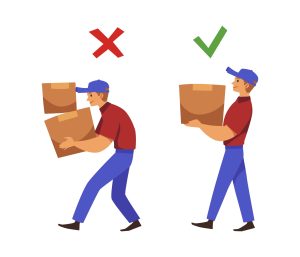In this guide, we’ll be discussing your employer’s legal obligations for manual handling tasks. Manual handling is using bodily force to carry, lift or support a load. A lot of job roles require some form of manual handling, but if your employer doesn’t take the steps that they need to keep you safe, it can be dangerous.
We’ll talk about your employer’s duty of care, and the legislations that are in place to protect workers who take part in manual handling activities. We’ll also discuss risk assessments, which play an important part in keeping workers safe.
Then, our guide will explore compensation in manual handling accident claims, including how compensation amounts are calculated. Finally, our guide will discuss the benefits of making a claim with an expert solicitor under a No Win No Fee agreement.
Contact Us
If you have any more questions about claiming for a manual handling injury, contact our team of helpful advisors by:
- Calling us on 020 8050 2736
- Starting your claim online.
- Using the live chat feature.
Select A Section
- Guidance About Your Employer’s Legal Obligations For Manual Handling Tasks
- Why Are The Health and Safety Regulations Relevant To An Employer’s Duty of Care?
- What Should An Employer’s Risk Assessment Consist Of?
- How Much Compensation From A Manual Handling Accident?
- Why Claim For Manual Handling Injuries Using A No Win No Fee Solicitor?
- Useful Resources About Your Employer’s Legal Obligations For Manual Handling Tasks
Guidance About Your Employer’s Legal Obligations For Manual Handling Tasks
All employees are protected by a duty of care, which is owed to them by their employers, whether undertake manual handling tasks or not.
This duty of care is outlined in the Health and Safety at Work etc. Act 1974(HASAWA), which states that your employer needs to take all reasonably practicable steps to keep you safe while working. For example, this could include ensuring that all employees have received sufficient training to perform their work duties, such as manual handling training and and providing appropriate personal protective equipment (PPE) when necessary.
The Manual Handling Operations Regulations 1992 outlines the steps that employers are expected to take when their employees are required to lift and carry heavy loads. We’ll talk more about these steps in the next section.
You could be able to make a personal injury claim, if you can demonstrate:
- Your employer breached their duty of care.
- This caused you to suffer your injuries.
If you’d like to learn more about the eligibility criteria for making a claim, contact our team of advisors today. Alternatively, you can read on to get more insight into manual handling injuries in the workplace.
Why Are The Health and Safety Regulations Relevant To An Employer’s Duty of Care?
The Management of Health and Safety at Work Regulations 1999 is a piece of legislation that works in tandem with The Manual Handling Operations Regulations 1992.
These may sound similar, but this is a very important piece of legislation, as it outlines your employer’s responsibility to assess the risks of certain tasks, including manual handling tasks, before asking you to perform them.
Some examples of steps that your employer should take in order to fulfil their duty of care include:
- Avoiding hazardous manual handling operations when it is reasonably practicable.
- Undertaking risk assessments to make sure that a task is safe before asking an employee to perform it.
- Reducing the manual handling risks presented in a task where possible, for example, splitting a heavy load between two boxes instead of asking an employee to carry it all in one.
Read on to learn more about risk assessments and how they can help prevent manual handling injuries in the workplace. Or, contact our team today to find out if you could make a claim if your employer didn’t fulfil their health and safety responsibilities and their legal obligations for manual handling tasks.
What Should An Employer’s Risk Assessment Consist Of?
As mentioned in the section above, your employer should undertake a risk assessment before asking you to perform a manual handling task. But what does a risk assessment entail?
The Health and Safety Executive (HSE) is Britain’s regulatory body for workplace safety and health. They have provided some guidance on what your employer should consider when they fill out a risk assessment for a manual handling task:
- How big the object is, and how heavy it is.
- How far you will have to carry the object.
- Whether or not the workspace is cluttered or walkways are obstructed, and how this will affect the task.
- Whether the task could be made easier with equipment or aids, such as a pallet truck or forklift.
This is one of your employer’s legal obligations for manual handling tasks. Before your employer can ask you to do the task, they need to be satisfied that the risk assessment has deemed it safe. They also need to make sure that they can mitigate any risks brought to light by the risk assessment.
What Are Your Employer’s Responsibilities After An Accident At Work?
Manual handling accidents can result in a number of injuries, from severe back injuries and knee injuries to minor foot injuries and toe injuries.
For example, if your employer deemed that a certain load needed to be carried by two people, but still made you carry it by yourself, this could cause you to suffer a strain injury in your back. Additionally, you may also potentially suffer a foot fracture due to dropping the heavy load as you could not carry it on your own safely.
In certain circumstances, your employer may need to report your injury under the Reporting of Injuries, Diseases, and Dangerous Occurrences Regulations (RIDDOR). Some examples of specified injuries your employer must report include:
- Amputations.
- Fractures.
- Crush injuries to the torso or head.
- Burn injuries.
- Injuries resulting in a loss of sight.
If you can prove that your employer failed to uphold their duty of care, and this caused you to suffer an injury, then you may be able to make an accident at work claim. Contact our team today to learn more.
How Much Compensation From A Manual Handling Accident?
Now that we’ve discussed your employer’s legal obligations for manual handling tasks, you might be wondering how much compensation you could receive for a successful manual handling claim.
If your claim succeeds, you’ll receive general damages, which cover the pain and suffering caused by your injuries. When this head of claim is valued, reference can be made to the Judicial College Guidelines (JCG), which provides guideline compensation brackets for different injuries.
The table below illustrates some of these brackets. Please note that the first entry from this table is not taken from the JCG.
Judicial College Guidelines
| Injury | Compensation Bracket | Notes |
|---|---|---|
| Multiple serious injuries and special damages | Up to £1,000,000+ | A combination of multiple serious injuries and compensation for special damages such as medical expenses, care costs and lost earnings. |
| Severe Back Injuries (a) (i) | £1111,150 to £196,450 | The most severe injuries, including damage to the nerve roots and spinal cord. |
| Severe Back Injuries (a) (ii) | £90,510 to £107,910 | Impaired mobility, nerve root damage with lost sensation, and unsightly scarring. |
| Severe Back Injuries (a) (iii) | £47,320 to £85,100 | Disc lesions, fractured discs, and soft tissue injuries that lead to chronic conditions. |
| Less Severe Elbow Injuries (b) | £19,100 to £39,070 | Injuries that don't need major surgery but still cause some impairment. |
| Moderate Knee Injuries (b) (i) | £18,110 to £31,960 | Weakness and instability causes by a torn meniscus, torn cartilage or dislocation. |
| Moderate Knee Injuries (b) (ii) | Up tp £16,770 | Less serious knee injuries that involve bruising, twisting and laverations. |
| Moderate Foot Injuries (f) | £16,770 to £30,500 | Continuing symptoms from metatarsal fractures that are displaced and cause a permanent deformity. |
| Serious Shoulder Injuries (b) | £15,580 to £23,430 | Pain and sensory symptoms caused by dislocation of the shoulder and damage to the lower part of the brachial plexus. |
| Moderate Shoulder Injuries (c) | £9,630 to £15,580 | Up to two years of discomfort and limited movement caused by frozen shoulder. |
Special Damages
You might also be able to claim special damages as part of your compensation settlement. This covers the financial losses you sustain as a result of your injuries. For example, this could help you cover the cost of:
- Lost earnings for time taken off work to recover.
- Travel costs to and from medical appointments.
- Help with cleaning, cooking, and gardening.
- Home adjustments, such as a ramp.
- Mobility aids, such as crutches or a wheelchair.
Evidence will need to be provided for the financial losses you are claiming for. This could include invoices, payslips and receipts.
For more information on compensation in personal injury claims, get in touch with our helpful team. They could also provide you with a free valuation for your specific case.
Why Claim For Manual Handling Injuries Using A No Win No Fee Solicitor?
Making an accident at work claim can seem daunting or complex, especially if you don’t have prior legal experience, but you don’t need to do it alone.
If you choose to work with a solicitor on your claim, they can help explain anything you don’t understand. They can also help you strengthen your case by collecting evidence, talking to witnesses, and requesting photographs or CCTV footage. Plus, a solicitor can help you communicate with the other party, and negotiate a settlement.
Our panel of solicitors work on a No Win No Fee basis and do this by offering those who work with them a Conditional Fee Agreement (CFA). Under a CFA, you don’t need to pay your solicitor for them to start on your claim, and you don’t need to pay for their work if your claim isn’t successful.
If it does succeed, then you’ll pay a success fee to your solicitor, which is a small percentage of your compensation. This small percentage is also capped by law, which helps to ensure that the majority of your compensation stays with you.
Contact Us
Our team of advisors are here to help. If you’d like to learn more about claiming because your employer failed to fulfil their legal obligations for manual handling tasks and this caused you to suffer an injury, contact us today by:
- Calling us on 020 8050 2736
- Starting your claim online.
- Using the live chat feature.
Useful Resources About Your Employer’s Legal Obligations For Manual Handling Tasks
For more helpful resources:
- Learn how to request CCTV footage of yourself from this Gov.UK resource.
- Guidance on reducing the risk of manual handling injuries from the HSE.
- Find out when to call 999 with this NHS guide.
Or, for more help on manual handling injuries and making an accident at work claim:
- Information on the most common industries and jobs at risk of manual handling injuries are discussed within this guide.
- In this guide, we discuss what are the causes of manual handling accidents and how your employer could help prevent them.
- If your employer provided you with no manual handling training and this caused you to suffer an injury, we discuss whether you may be able to make a claim within this guide.
Thank you for reading our guide on your employer’s legal obligations for manual handling. If you have suffered an injury due to your employer’s failure to adhere to their legal obligations, you can contact our advisors to see whether you may be able to claim compensation.




